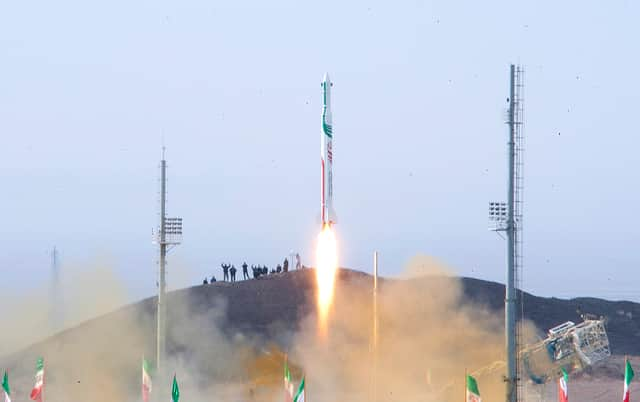Iranian Space Agency: animals are sent into space amid accusations of nuclear weapons


Iran has claimed it has launched animals into space as it begins to prepare to send up astronauts in the next few years. The animals, who were in a capsule, went 80 miles into orbit according to a report by the official IRNA news agency that quoted telecommunications minister Isa Zarepour.
He said the 1,000lb (450kg) capsule was part of its plans for human missions by 2029 but neglected to state which animals were in the capsule. State TV showed footage of a rocket named Salman carrying the capsule into the sky however the launch location was not disclosed.
Advertisement
Hide AdAdvertisement
Hide AdIran’s space agency was formed in 2004, and became an orbital launch-capable nation in 2009. Since then it has announced several successful launches of satellites and other spacecrafts.
In 2013, Iran launched a monkey into space, and in September this year, it said it sent a data-collecting satellite into space. The programme is wrapped in mystery and the US and other Western countries have always been suspicious because the same technology can be used to develop long-range missiles.
The US has alleged Iran's satellite launches defy a UN Security Council resolution and has called on Tehran to undertake no activity related to ballistic missiles capable of delivering nuclear weapons, and in 2018 former president Donald Trump withdrew the US from the 2015 nuclear agreement with world powers - drawn up to ensure Iran's nuclear programme was "exclusively peaceful" - and restored crippling sanctions.
Since then, the agreement hasn’t been revived and the International Atomic Energy Agency (IAEA) has said Iran has enough uranium enriched to near-weapons-grade levels to build "several" nuclear weapons should it choose to do so.
However, Iran has always denied seeking nuclear weapons and says its space activities and nuclear programmes are purely for civilian purposes and scientific research.
Comment Guidelines
National World encourages reader discussion on our stories. User feedback, insights and back-and-forth exchanges add a rich layer of context to reporting. Please review our Community Guidelines before commenting.
